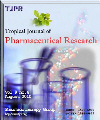
|
Tropical Journal of Pharmaceutical Research
Pharmacotherapy Group, Faculty of Pharmacy, University of Benin, Benin City, Nigeria
ISSN: 1596-5996
EISSN: 1596-5996
Vol. 15, No. 12, 2016, pp. 2733-2738
|
 Bioline Code: pr16360
Bioline Code: pr16360
Full paper language: English
Document type: Research Article
Document available free of charge
|
|
|
Tropical Journal of Pharmaceutical Research, Vol. 15, No. 12, 2016, pp. 2733-2738
| en |
Anticoagulant effect of low molecular weight heparin on central venous catheters in haemodialysis patients
Li, Ru-Fen; Cui, Xiang-Qin & Xu, Li-Ping
Abstract
Purpose: To analyse the effect of low molecular weight heparin on venous catheters in haemodialysis
patients.
Methods: This study included 140 eligible patients who were randomly and evenly divided into two
groups, viz, a study group that received low molecular weight heparin and a control group that received
conventional heparin. The clinical effects and incidence of complications were compared for the two
groups.
Results: No significant difference in general characteristics or the incidence of tube occlusion was
detected between the two groups. The mean blood flow volume of the study and control groups were
223.50 ± 19.10 and 222.70 ± 18.70 mL/min, respectively (t = 0.940, p > 0.05), and the incidences of
complications (long-term vascular secondary changes and bleeding tendency within 1 year after tube in
dwelling) were lower in the study group than in the control group. After haemodialysis, the activated
partial thromboplastin time and prothrombin time were shortened in the study group compared with the
control group, whereas the platelet level was higher in the study group (146 ± 33 × 109/L) than in the
control group (95 ± 36 × 109/L).
Conclusion: The use of low molecular weight heparin as an anticoagulant solution for patients
undergoing haemodialysis with central venous catheters (CVCs) is less likely to induce haemodialysis-associated
complications and has fewer effects on coagulation function than conventional heparin.
Thus, low molecular weight heparin seems to be more suitable as an anticoagulant solution in patients
with venous catheters.
Keywords
Low molecular weight heparin; Haemodialysis; Central venous catheter; Vascular access
|
| |
© Copyright 2016 - Pharmacotherapy Group, Faculty of Pharmacy, University of Benin, Benin City, 300001 Nigeria.
Alternative site location: http://www.tjpr.org
|
|
